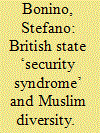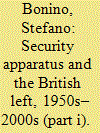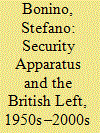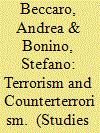| Srl | Item |
| 1 |
ID:
144900


|
|
|
|
|
| Summary/Abstract |
This paper explores the securitisation of British Muslims within a global context in which tensions are reignited by the threat that Islamist terrorism, and Islam more generally, are considered to pose to the West. While Western involvement in Muslim-majority countries continues to fuel the idea of a ‘clash of civilisations’, domestic responses to terrorism and extremism take forward its rhetoric. At the heart of 15 years of wide-ranging responses lies the state ‘security syndrome’. Operating through the paradigm of risk reduction, the British state has reasserted its primary role as the distributor of security in ways that move beyond the surgical targeting of violent Islamists and their supporters and instead risk impacting on Muslims qua Muslims. Counter-terrorism and anti-extremism notions and practices that conflate security risks and cultural threats signal that Great Britain is a liberal democracy that is yet to fully foster positive inter-community relations and achieve social cohesion.
|
|
|
|
|
|
|
|
|
|
|
|
|
|
|
|
| 2 |
ID:
140788


|
|
|
|
|
| Summary/Abstract |
This article offers a first academic evaluation of the Special Demonstration Squad and the National Public Order Intelligence Unit, two British undercover police units working for the Metropolitan Police Service at different times between 1968 and 2011. It provides a historical overview of their infiltration of political groups involved in protest for the purpose of gathering criminal and political intelligence aimed at preventing violence, public disorder, and subversion. It discusses the controversies surrounding these units, and the related institutional responses, and offers an attempt at understanding their operations within the remit of intelligence-led policing and against a political culture that prioritizes action over inaction in reducing risks and threats to the State and society.
|
|
|
|
|
|
|
|
|
|
|
|
|
|
|
|
| 3 |
ID:
158527


|
|
|
|
|
| Summary/Abstract |
Part I and Part II (forthcoming) focus on the ongoing Undercover Policing Inquiry into past undercover police operations in the United Kingdom, but take a wider perspective and employ a longer historical trajectory to explore the political terrain underpinning the domestic activities of the Security Service and Special Branch vis-à-vis predominantly left-wing and/or radical groups during and after the Cold War. Part I explores the histories, possibilities, and dilemmas of undercover policing of, and intelligence gathering among, political groups and the evergreen Communist and “far and wide left” threats that were perceived as menacing the United Kingdom.
|
|
|
|
|
|
|
|
|
|
|
|
|
|
|
|
| 4 |
ID:
161734


|
|
|
| 5 |
ID:
188764


|
|
|
|
|
| Summary/Abstract |
The aim of this article is to understand why there has not been a successful jihadist terrorist attack in Italy. While it is impossible to offer a clear and unambiguous explanation, there are some unique aspects of the Italian case that should be emphasized and that can offer a convincing, albeit incomplete, answer to this narrative. The article will first highlight the fact that in Italy there have in fact been some attempted terrorist attacks and that the country has experienced jihadist terrorist activities. Subsequently, the article turns to an exploration of Italian counterterrorism in order to emphasize the most convincing and effective aspects, in particular the role of the legislation and the Antiterrorism Strategic Analysis Committee (CASA). Then, the article takes a more sociological perspective and analyzes the ways in which the social composition of the Muslim communities in Italy and their presence in its territories have affected the phenomenon of terrorism. In its conclusions, the article will reiterate why the country has remained exceptionally free of a successful terrorist attack, despite not being immune to jihadist propaganda.
|
|
|
|
|
|
|
|
|
|
|
|
|
|
|
|